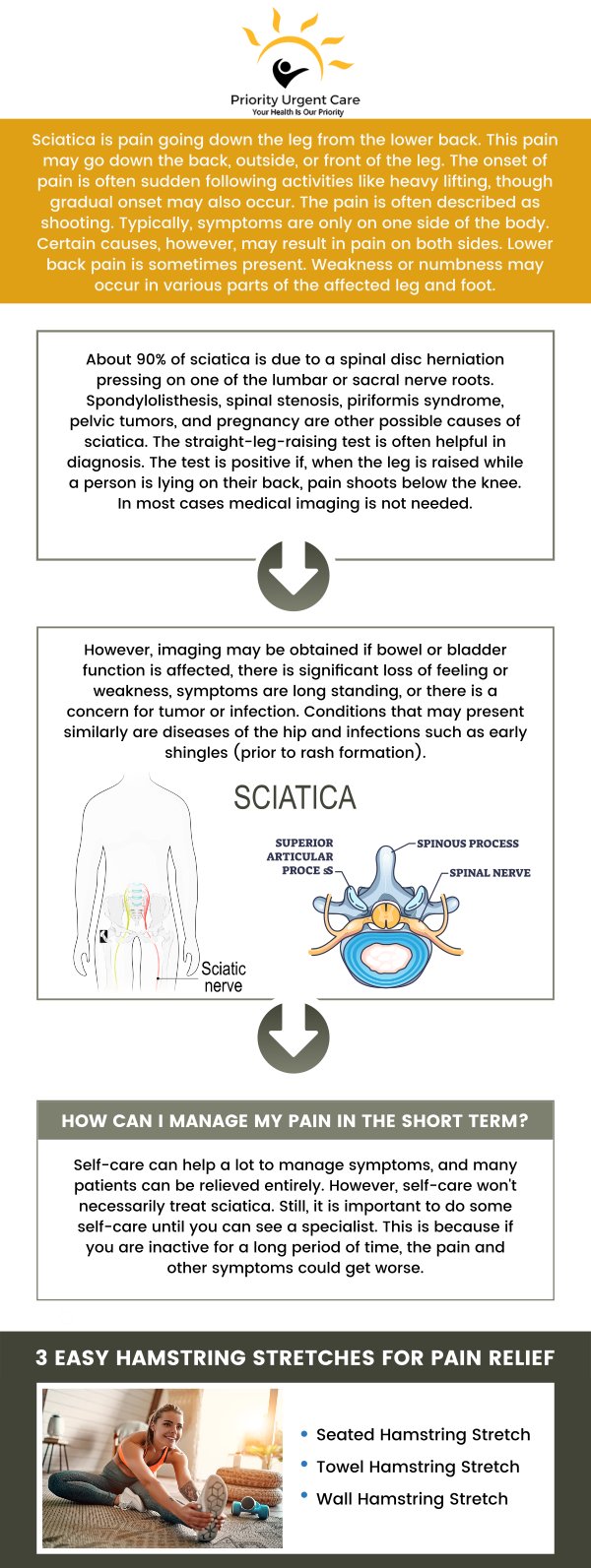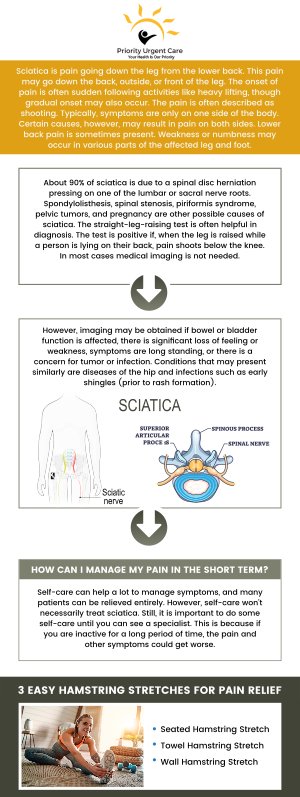Urgent Care for Sciatica Pain Q&A
Sciatica pain is typically caused by a herniated disc or bone overgrowth putting pressure on a nerve. It results in inflammation, discomfort, and numbness in the affected leg. Priority Urgent Care and Walk-In Clinic provide specialized treatment for sciatica or lower back pain. For more information, please contact us or book an appointment online. We have convenient locations to serve you in Cromwell, CT, East Haven, CT, Ellington, CT, Newington, CT, Oxford, CT, Unionville, CT and Wallingford, CT.




Table of Contents:
What is the best treatment for sciatica?
How do I get my sciatic nerve to stop hurting?
How long will sciatica take to heal?
What triggers sciatica?
At Priority Urgent Care and Walk-In Clinic, we are proud to provide excellent sciatica treatment to patients in Connecticut. We welcome you to come to one of our two locations for a walk-in appointment!
Sciatica can be a difficult condition to deal with, as it typically causes moderate to severe pain through your lower back, buttocks, and down your legs that worsens with movement, in addition to possible numbness and weakness. If you are dealing with sciatica, our board-certified physicians at Priority Urgent Care and Walk-In Clinic would be more than happy to help you overcome and find lasting relief from your sciatica pain.
When treating sciatica, treatment options are usually determined by the physician on a case-by-case basis, after reviewing the patient’s medical history, considering any underlying medical conditions they have, and assessing the severity of their condition. With that in mind, there are several effective treatment options for sciatica that your physician can choose from to help you manage your symptoms and heal in the best way possible.
Some of these treatment options could include any of the following:
• Anticonvulsant medication, such as gabapentin (Gralise, Neurontin, Horizant), to blunt pain signals in the nerves
• Muscle relaxant medication, such as Robaxin or Zanaflex
• Physical therapy to strengthen the spine, lower back, buttocks, hip, and abdomen, stretch tight or inflexible muscles, and increase circulation
• Short-term use of non-steroidal anti-inflammatory drugs (NSAIDs), such as ibuprofen (Advil) or naproxen (Aleve)
• Steroid injections, using corticosteroids to reduce pain and inflammation around the irritated nerve
• Tricyclic antidepressants, such as Elavil, to help reduce nerve pain
If first-line treatment options fail to improve sciatica, surgery may also be considered to remove bone spurs or herniated discs that are pressing on the sciatic nerve.
If you are having trouble getting your sciatic nerve to stop hurting, there are several at-home remedies that may provide temporary relief. You may also consider alternative therapies such as acupuncture or massage therapy. With that being said, it is best to consult with a medical professional about such remedy options to prevent complications and ensure the best results. If you are looking for help with getting your sciatic nerve to stop hurting, our board-certified physicians at Priority Urgent Care and Walk-In Clinic would be more than happy to help and provide informed advice on what you can do for pain relief.
The length of time it takes for sciatica to heal typically depends on whether it is acute or chronic. As such, an acute episode of sciatica may last between one to six weeks before it resolves itself. In contrast, chronic sciatica is typically diagnosed when sciatica lasts for longer than two months and can last two years or more.
Sciatica pain occurs when the sciatic nerve in the lower back becomes compressed, inflamed, irritated, or pinched. The most common cause of sciatica is when a herniated or slipped disk, which are cushioning pad between each spinal vertebra, puts pressure on the sciatic nerve root.
Other causes of sciatica include the following:
• Degenerative disc disease, which is the natural deterioration of the vertebrae of the spine
• Osteoarthritis, causing bone spurs to compress the sciatic nerve
• Piriformis syndrome, which is a condition where the piriformis muscle in the buttocks has spasms or becomes too tight, putting pressure on the sciatic nerve
• Spinal stenosis, which is an abnormal narrowing of the spinal canal, leaving less available space for the sciatic nerve
• Spondylolisthesis, which occurs when one vertebra slips out of place, causing the spinal bone to pinch the sciatic nerve
• Tumors in the lumbar portion of the spine can compress the sciatic nerve
If you or someone you love has sustained a minor injury or illness, come to Priority Urgent Care today! Our walk-in clinic is equipped to handle almost any non-life-threatening medical concern, from the common cold to cuts and burns. Contact us today to book an appointment. We serve patients from Cromwell, CT, East Haven, CT, Ellington, CT, Newington, CT, Oxford, CT, Unionville, CT, Wallingford, CT, and BEYOND!

Additional Services You May Need
▸ Urgent Care
▸ DOT Physicals
▸ Worker’s Injury Treatment
▸ Drug Testing
▸ Physical Exams
▸ School/Sports Physicals
▸ Sports Injury Treatment
▸ X-Ray Services
▸ Pediatric Urgent Care
▸ Poison Ivy
▸ STD Testing
▸ Immunizations & Vaccinations
▸ Lab Testing
▸ Pre-Employment Physical
▸ Employer Services


